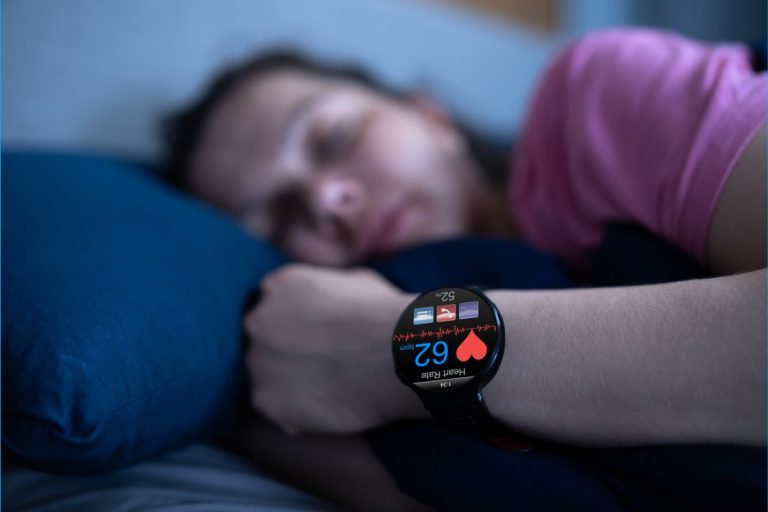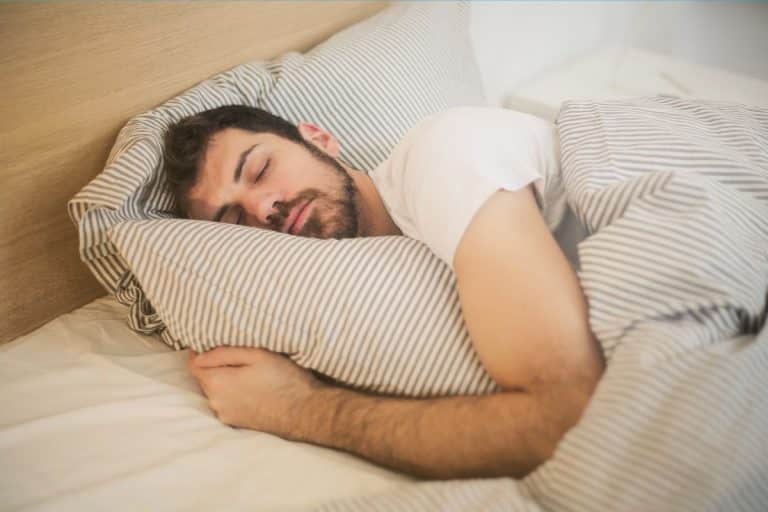Sleep is essential for our physical, mental, and spiritual health. The thought of sleeping after a long and difficult day feels relieving and rewarding for a lot of people who’ve been thinking about the bedtime since the moment they woke up.
Proper sleep cycle helps us restore our body and mind and go through the challenging day-to-day life.
However, some people suffer from the so-called fear of sleep, also known as somniphobia, which leads to traumatic experiences and images of sleep.
Instead of the rewarding feeling of restful sleep, somniphobia causes fear of nightmare, loss of sensation, hearing, ability to speak, and much more. In this article, we’ll talk about the causes of this odd disorder and how to overcome the fear of sleep.
Somniphobia Symptoms
According to the Sleep Association U.S., 50-70 million US citizens report some sort of sleep disorder. Somniphobia can be a consequence of some sleep disorders like nightmare disorder, sleep paralysis, or even insomnia.
Here are the most common symptoms of the fear of sleep.
- Anxiety – As the bedtime approaches, you’re becoming anxious about going to and falling asleep. The anxiety may intensify if you think about sleeping through the day about going to sleep.
- Panic attacks – Some people who suffer from this phobia may experience panic attacks and intense distress just as the bedtime approaches.
- Avoiding going to bed – Some people will purposely delay the bedtime, finding activities to partake in the late hours in the night, just to avoid going to sleep.
- Focus – Some people experience loss of focus because they’re constantly thinking and worrying about sleeping. This prevents people from focusing on their daily activities.
While the symptoms vary in different groups, some people have it even harder. For them, the somniphobia symptoms may manifest physically and they might experience the following symptoms.
- Nausea, cramps, and bad stool as a result of constant anxiety.
- Heart sinking, tightness, and heaviness in the chest.
- Increased heart rate when thinking about sleep.
- Hot flashes, chills, sweating, and breathing problems.
Some symptoms in children may include:
- Wanting to sleep with their parents.
- Constant clinginess.
- Avoidance of sleeping even past the bedtime.
- Crying in the evening and night.
What Causes the Fear of Sleep?
Many people don’t even know they have a problem until the sleep deprivation affects their everyday life. And even if they are consciously aware of their phobia, they don’t know where it came from.
Even doctors and sleep experts struggle in finding the exact cause of somniphobia. Still, it’s believed it originates from some certain sleep disorders. In this list, you may be able to find what caused your abnormal fear of sleep.
Sleep Paralysis – Sleep paralysis is one of the worst things that could happen to a person who sleeps. It happens when the brain wakes up but the body is still asleep. The person can look around, and usually, the brain causes some disturbing images to appear on the walls, ceiling, floor, causing unnerving hallucinations. The sensation can last from seconds to minutes and completely disturb the sleeper.
Nightmare Disorder – Nightmares are part of everyone’s life and it’s no secret that a lot of people fear to fall asleep due to recurrent nightmares. According to Mayo Clinic, the nightmare disorder is rare but it can cause extremely vivid nightmares where it’s extremely difficult to distinguish between the real and fake, causing fear of sleep.
Post-traumatic stress disorder (PTSD) can also lead to severe nightmares and lead to fear of sleep. This fear of sleep can gradually transform into somniphobia if not spotted and treated immediately.
Also, the somniphobia and sleep anxiety are linked to the fear of dying during sleep, as spotted in one study.
The fear of falling asleep can also come from other fears which are not a cause for concern. We also highlighted other potential causes of somniphobia below.
- Sleep talking – If you live with a partner or someone else, you may feel embarrassed about sleep talking and waking them up unintentionally. That’s why some people develop a fear of sleep.
- Sleepwalking– Sleepwalking may be a result of restless sleep, but also a disorder of its own. In this state, a lot of people may be unpredictable which could end up in an accident. Due to this state of mind people can’t control easily without help, somniphobia may appear as a result.
- Something you saw – Some movie, especially horror, a story you heard, or any disturbing information could alter your sleep cycle to the point you may become afraid of falling asleep.
How to Overcome the Fear of Sleep?
Even if you’re afraid of going to sleep because of some of the aforementioned causes, don’t worry. Through small steps or help, you can overcome the fear of sleep.
Healthy Sleep Hygiene
A healthy sleep routine is the first and most important step to take.
Remember, somniphobia could be a cause of insomnia-caused or sleep paralysis-caused sleep deprivation. Still, only with a fresh mind, you’ll be able to think rationally and distinguish between your fears and anxiety.
The best time to sleep is between 10 pm and 6 am. That’s exactly eight hours which is, according to the experts, just the right amount of sleep.
Write in a Journal
Journals are a good way to let go of your worries and put all your thoughts on paper. Given that the thought of sleeping can be extremely unnerving for you, knowing what you can put on paper is of extreme importance.
For example, you can write in a diary about your nightmares, sleep paralysis, or incidents that occurred.
Additionally, you can make a comparison between the personal pros and cons of sleeping for that night. For example, you can write in about that “exam you have today or a meeting and why you need night’s sleep that night.
If your fear of sleep is a result of a horror movie you watched, remember about the times you used to go to sleep before watching that movie or a certain incident occurring.
Whatever has happened is over now, and you’ll be able to drift into the dreamland.
Make the Right Sleep Environment
Sleep environment is extremely important for night’s rest.
Normally, experts recommend sleeping with no lights of sources of noise.
However, if you or your child sleep alone, it’s a good idea to leave the bedroom door open and a dim light outside, just to remind you that you can see your surroundings and that there is no danger outside.
White Noise Machine
A lot of people use white noise machines to help them fall asleep. The frequency of white noise has soothing properties that help guide one to sleep.
While for some it may be disruptive, a lot of people play or download presets like the rain and thunderstorm sounds, fireplace, waves, and more.
The soothing background noise will help you take your mind off the worries and imagine you’re wherever you want to be.
Talk to a Friend
People are social creatures and we shouldn’t ignore the social interactions. Everyone has a different approach to solving their problems so talking to other people about your problems may give you important insight.
Perhaps, your best friend or colleague was battling the same issues and they weren’t comfortable talking about it.
Embrace Your Fears
Usually, people who write sleep journal will choose to embrace their fears sooner than later. Just like in everyday life, we accept and approach our problems so that we can solve them so that we can feel better.
The same goes for sleep. Once you find out the culprit behind your sleep phobia ask yourself “How can I change this?” “What can I do to make my fears stop?” “How will my actions affect me?” Those questions keep the key to solving your sleep-related problems.
When is the Time to See a Doctor?
If you feel your problem has been too overwhelming for you, it’s time to see a professional. Humans are incredible creatures, capable of solving the most difficult problems in their interest.
But, not everyone can solve everything. People who can no longer sleep and function daily should look for professional help so that they can be able again.
Your therapist or doctor will suggest different methods to treat your problem. It’s important to note that different methods yield different results for certain causes of sleep phobia.
Exposure Therapy
Exposure therapy involves talking to your therapist about the fear you have and slowly embracing it. With each next session, you’ll open up a bit more about the fear you have. You’ll talk about nightmares, sleep paralysis through professional relaxation techniques. As you reveal more, you’ll sleep easier.
Moreover, exposure therapy effectiveness is improved through sleep, according to a study from Cambridge. The more you sleep restfully, the more effective the therapy will be.
Cognitive Behavioral Therapy (CBT)
This methodology sees establishing behavioral patterns that may affect your biological clock and the way you see your sleep hygiene. Through this therapy, you’ll learn to alter your thoughts at the times you experience anxiety or panic attack as a result of needing to sleep.
Your therapist may also establish restriction patterns that may change your lifestyle a little to see whether it’ll yield a result. In this case, it’d be a restriction of your sleep cycle.
The method has even been backed by a study that examined 45 adults who suffered from PTSD or insomnia-related sleep phobia.
What About Medicines?
There are no medicines that are native to this condition as researchers still look for the true cause of sleep phobia. Still, in the short term, your therapist may prescribe you beta-blockers or benzodiazepine types of medicines.
The first will help you maintain a normal heart rate in anxiety-related situations. The latter works as a sedative. The latter is also less likely, and may only be prescribed for a short amount of time as it’s addictive and could lead to long-term problems.
Conclusion
Several things can cause sleep phobia. However, the same symptoms may not manifest with everyone, nor will the causes.
The thing that is up to you is to remember that sleep works in a restorative way and that it’s important for the normal functioning of the human body in mind. If you struggle to overcome your fears, there’s no shame in talking to a friend or seek a friend.
Have you ever been scared of sleeping? Let us know why it happened and what steps did you take to minimize the feature or eliminate it in entirety.





